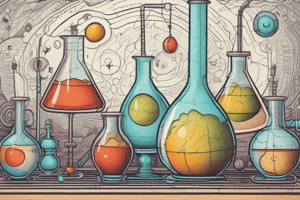Podcast
Questions and Answers
What was the outcome of the statistical analysis conducted on the difference between the groups?
What was the outcome of the statistical analysis conducted on the difference between the groups?
- It rejected the hypothesis that there is a significant difference in the rates of coffee drinking between groups. (correct)
- It showed that there is no correlation between coffee drinking and Alzheimer's disease.
- It found a statistically significant difference in the rates of coffee drinking between groups.
- It proved that coffee drinking causes Alzheimer's disease.
What is the primary goal of scientists when conducting experiments?
What is the primary goal of scientists when conducting experiments?
- To prove hypotheses and theories.
- To support or reject hypotheses rather than proving or disproving them. (correct)
- To come to a consensus on an explanation and close the case.
- To eliminate all possibilities and prove a single explanation.
What happens to a hypothesis after it has been supported by a significant amount of peer-reviewed experiments?
What happens to a hypothesis after it has been supported by a significant amount of peer-reviewed experiments?
- It is rejected and a new hypothesis is formed.
- It is promoted to become a scientific theory. (correct)
- It is abandoned and a new experiment is designed.
- It is considered a proven fact.
What is the purpose of peer review in the scientific process?
What is the purpose of peer review in the scientific process?
What is the primary difference between a scientific theory and a colloquial theory?
What is the primary difference between a scientific theory and a colloquial theory?
What is the problem with bias in the scientific method?
What is the problem with bias in the scientific method?
What is the purpose of the scientific method in relation to bias?
What is the purpose of the scientific method in relation to bias?
What is the consequence of using bias in data collection and conclusion formation?
What is the consequence of using bias in data collection and conclusion formation?
What is the purpose of repeat testing and peer review in the scientific method?
What is the purpose of repeat testing and peer review in the scientific method?
What is the example of bias in the given scenario about Christina's experiment?
What is the example of bias in the given scenario about Christina's experiment?
What is the primary goal of a scientific experiment?
What is the primary goal of a scientific experiment?
What happens when a hypothesis is supported by a significant amount of peer-reviewed experiments?
What happens when a hypothesis is supported by a significant amount of peer-reviewed experiments?
What is a major difference between a scientific theory and a colloquial theory?
What is a major difference between a scientific theory and a colloquial theory?
How do biases affect the scientific method?
How do biases affect the scientific method?
What is the purpose of repeat testing and peer review in the scientific method?
What is the purpose of repeat testing and peer review in the scientific method?
What is the consequence of using bias in the scientific method?
What is the consequence of using bias in the scientific method?
What is the role of peer review in the scientific process?
What is the role of peer review in the scientific process?
What is the difference between a scientific theory and a hypothesis?
What is the difference between a scientific theory and a hypothesis?
What is the purpose of the scientific method?
What is the purpose of the scientific method?
What is an example of bias in the scientific method?
What is an example of bias in the scientific method?
Flashcards are hidden until you start studying
Study Notes
The Scientific Method
- The scientific method is a procedure used to provide scientific explanations for questions about the world.
- It outlines the way a scientist can perform an experiment to collect empirical data, which can be used to answer a question.
Key Components of the Scientific Method
- Question: a problem the scientist is looking to solve
- Background: information that is already available from other experiments that can help inform the scientist about the topic
- Hypothesis: a proposed explanation that can be empirically tested
- Experiment: a scientific test that provides empirical data for a specific hypothesis
- Empirical Data: information that is verifiable by observation and/or experience
- Conclusion: an answer to the research question as suggested by the data, which may support or reject the hypothesis
The History of the Scientific Method
- The scientific method has evolved and changed over the years.
- Sir Francis Bacon is credited with its first documentation in 1620.
- Other notable contributors include Aristotle, Galileo, Ibn al-Haytham, and Isaac Newton.
Variations in Different Disciplines
- The scientific method steps follow the same general pattern, but there is some variation between disciplines.
- Different disciplines require different methods, and even within each discipline, there may be variations depending on what is being studied.
The Six Steps of the Scientific Method
- Ask a Question: make an observation and ask a question about it
- Conduct Background Research: research existing knowledge about the topic
- Formulate a Hypothesis: propose an explanation that can be tested
- Design and Conduct an Experiment: test the hypothesis
- Analyze the Data: examine the data to determine if it supports or rejects the hypothesis
- Draw a Conclusion: answer the research question based on the data
The Scientific Method in Practice
- The scientific method is not a linear process, but rather a cyclical one, where steps may be revised or reworked.
- It is used in various fields, including psychology, physics, geology, and philosophy.
- Examples of the scientific method in practice include:
- Dwayne's internet problem: identifying the problem, researching, forming a hypothesis, testing, and drawing a conclusion.
- Investigating the relationship between coffee consumption and Alzheimer's disease.
The Formation of a Scientific Theory
- A scientific theory is a well-substantiated explanation for a set of phenomena, supported by a significant amount of peer-reviewed experiments.
- Hypotheses are rarely proven, but rather supported or rejected through experimentation.
- Examples of scientific theories include Einstein's Theory of Gravity, the Theory of Evolution, and the Big Bang Theory.
Beliefs and Biases
- Bias can be a problem in the scientific method, as it can influence the way data is collected and interpreted.
- The scientific method is designed to avoid bias, but it is not perfect.
- Peer review and repeat testing are used to flag and correct errors caused by bias.
The Scientific Method
- The scientific method is a procedure used to provide scientific explanations for questions about the world.
- It outlines the way a scientist can perform an experiment to collect empirical data, which can be used to answer a question.
Key Components of the Scientific Method
- Question: a problem the scientist is looking to solve
- Background: information that is already available from other experiments that can help inform the scientist about the topic
- Hypothesis: a proposed explanation that can be empirically tested
- Experiment: a scientific test that provides empirical data for a specific hypothesis
- Empirical Data: information that is verifiable by observation and/or experience
- Conclusion: an answer to the research question as suggested by the data, which may support or reject the hypothesis
The History of the Scientific Method
- The scientific method has evolved and changed over the years.
- Sir Francis Bacon is credited with its first documentation in 1620.
- Other notable contributors include Aristotle, Galileo, Ibn al-Haytham, and Isaac Newton.
Variations in Different Disciplines
- The scientific method steps follow the same general pattern, but there is some variation between disciplines.
- Different disciplines require different methods, and even within each discipline, there may be variations depending on what is being studied.
The Six Steps of the Scientific Method
- Ask a Question: make an observation and ask a question about it
- Conduct Background Research: research existing knowledge about the topic
- Formulate a Hypothesis: propose an explanation that can be tested
- Design and Conduct an Experiment: test the hypothesis
- Analyze the Data: examine the data to determine if it supports or rejects the hypothesis
- Draw a Conclusion: answer the research question based on the data
The Scientific Method in Practice
- The scientific method is not a linear process, but rather a cyclical one, where steps may be revised or reworked.
- It is used in various fields, including psychology, physics, geology, and philosophy.
- Examples of the scientific method in practice include:
- Dwayne's internet problem: identifying the problem, researching, forming a hypothesis, testing, and drawing a conclusion.
- Investigating the relationship between coffee consumption and Alzheimer's disease.
The Formation of a Scientific Theory
- A scientific theory is a well-substantiated explanation for a set of phenomena, supported by a significant amount of peer-reviewed experiments.
- Hypotheses are rarely proven, but rather supported or rejected through experimentation.
- Examples of scientific theories include Einstein's Theory of Gravity, the Theory of Evolution, and the Big Bang Theory.
Beliefs and Biases
- Bias can be a problem in the scientific method, as it can influence the way data is collected and interpreted.
- The scientific method is designed to avoid bias, but it is not perfect.
- Peer review and repeat testing are used to flag and correct errors caused by bias.
Studying That Suits You
Use AI to generate personalized quizzes and flashcards to suit your learning preferences.




